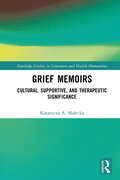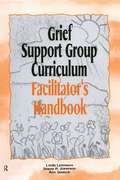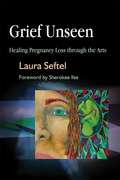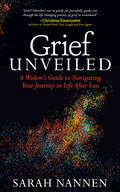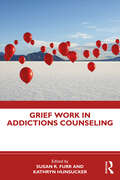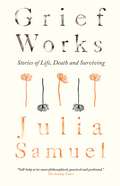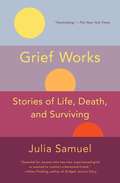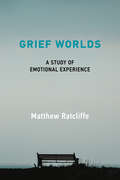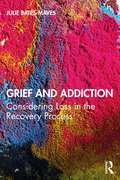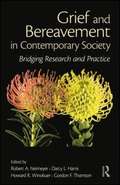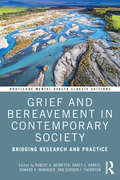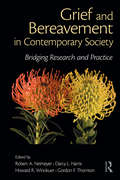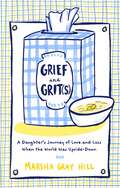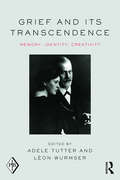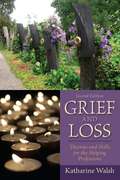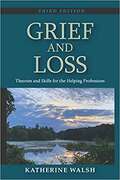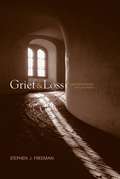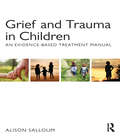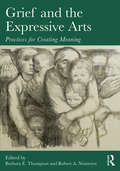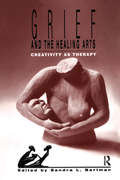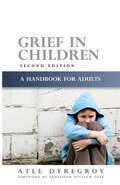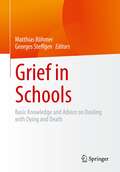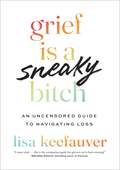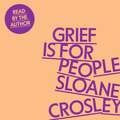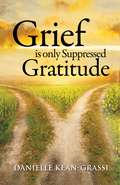- Table View
- List View
Grief Memoirs: Cultural, Supportive, and Therapeutic Significance (Routledge Studies in Literature and Health Humanities)
by Katarzyna A. MałeckaGrief Memoirs: Cultural, Supportive, and Therapeutic Significance bridges literary studies and psychology to evaluate contemporary grief memoirs for use by bereaved and non-bereaved individuals. This volume positions the grief memoir within life writing and bereavement studies through examination of the genre’s characteristics, definitions, and functions. The book presents the views of memoirists, helping professionals, community members, and university students on writing and reading as self-expressive, self-searching, and grief-witnessing acts after the loss of a loved one. Utilizing new data from surveys assessing grief support and bibliotherapy, this text discusses the compatibility of grief memoirs with contemporary grief theories and the role of interdisciplinary methods in assisting the bereaved. Grief Memoirs: Cultural, Supportive, and Therapeutic Significance will help educators advance the understanding and interpretation of loss within psychology, literature, and medical humanities classrooms.
Grief Support Group Curriculum: Facilitator's Handbook
by Shane R. Jimerson Linda Lehmann Ann GaaschThe Grief Support Group Curriculum provides a basis for assisting children and teenagers as they learn about mourning through facing death of a close or special friend. The aim of this curriculum is to facilitate healthy variations of mourning and positive adaptations following the death of a friend or family member. The work illustrates mourning in four stages of development and is accordingly divided into four separate texts. The texts focus on preschool-aged children, children in kindergarten through grade two, children in grades three through six, and teenagers.
Grief Unseen: Healing Pregnancy Loss through the Arts
by Laura SeftelAt least one in five pregnancies ends in miscarriage, yet pregnancy loss remains a taboo topic and effective aftercare is rarely available for those who have experienced it. Grief Unseen explains the different kinds of childbearing losses, such as failed fertility treatment, ectopic pregnancy, and stillbirth, and explores their emotional impact on women and their partners, and the process of healing. An established art therapist and mental health counselor, Laura Seftel shares her own experiences of miscarriage and recovery, and describes the use of art and ritual as a response to loss in traditional and modern cultures. She presents a rich variety of artists who have explored pregnancy loss in their work, including Frida Kahlo, Judy Chicago, and Tori Amos, and shows how people with no previous artistic experience can generate creative responses as part of the healing process. The book includes step-by-step exercises in guided imagery, poetry, visual art, journaling, and creating rituals. This accessible, positive resource will be useful to practitioners in the fields of medicine, mental health, art therapy, and counseling, as well as women and families who have suffered pregnancy loss.
Grief Unveiled: A Widow's Guide to Navigating Your Journey in Life After Loss
by Sarah Nannen&“The book outlines wisdom and guidance on how to reclaim one&’s life after sudden tragedy offering genuine hope for a new tomorrow&” (Patti Smith, president, America&’s Gold Star Families). Widowhood leaves you forever changed but does not have to mean forever suffering. Grief Unveiled is a love letter from a widow sister that will change what you believe is possible in life after loss. This book acts as a guide to those supporting the bereaved just as it illuminates a path for anyone traveling the road of widowhood. Based on her personal experiences in grief and those of her clients, Sarah Nannen offers a deeply intimate look at widowhood through the lens of hope and possibility while honoring the depth of grief&’s pain. GriefUnveiled shows you how to stop just surviving and thrive in life after loss. &“Sarah illustrates the challenges encountered on the path through grief with such tender accessibility, offering both inspiration, empowerment, and solidarity to fellow widows.&” —Christina Rasmussen, author of Where Did You Go? &“I remember not being able to hold back tears the first time I heard Sarah&’s story. Partly because of what she experienced, but more so because I was overwhelmed by the amount of beauty, joy, love and vibrance surrounding her, reflected in her friends and family. With this book, her words, her story and her wisdom can help you do the same. What a gift.&” —Elizabeth DiAlto, host of the Untame the Wild Soul podcast, author of Untame Yourself
Grief Work in Addictions Counseling
by Susan R. Furr Kathryn HunsuckerGrief Work in Addictions Counseling is a book for practitioners and students in the field of substance abuse counseling who encounter grief and loss issues with clients recovering from addiction. Enlightening the reader about loss, its relation to addiction, and the need to grieve these losses, this book provides specific strategies and techniques that readers can apply to both individual clients and counseling groups. Chapters address multicultural themes to help clinicians design treatments that will meet the needs of diverse genders, sexual orientations, cultures, ages, and spiritual orientations. This book is useful both for professionals and as a supplemental textbook for students preparing to become addictions counselors.
Grief Works: Stories of Life, Death and Surviving
by Julia SamuelA warm, moving and practical guide to grief from a leading bereavement counsellor, Grief Works features deeply affecting case studies of the author's clients, which will appeal to readers of Atul Gawande's Being Mortal, Stephen Grosz's The Unexamined Life and Paul Kalanithi's When Breath Becomes Air. <P><P>Death is the last taboo in our society, and grief is still profoundly misunderstood. So many of us feel awkward and uncertain around death, and shy away from talking honestly with family and friends. <P><P>Grief Works is a compassionate guide that will inform and engage anyone who is grieving, from the "expected" death of a parent to the sudden unexpected death of a small child, and provide clear advice for those seeking to comfort the bereaved. <P><P>With deeply moving case studies of real people's stories of loss, and brilliantly accessible and practical advice, Grief Works will be passed down through generations as the definitive guide for anyone who has lost a loved one, and revolutionize the way we talk about life, loss and death.
Grief Works: Stories of Life, Death, and Surviving
by Julia SamuelAn instant bestseller in the UK, Grief Works is a profoundly optimistic and compassionate handbook for anyone suffering a loss—from the expected death of a parent to the sudden death of a child or spouse—as well as a guide for those who want to help their grieving loved ones.Death affects us all. Yet it is still the last taboo in our society, and grief is still profoundly misunderstood. So many of us feel awkward and uncertain around death, and shy away from talking honestly with family and friends. Julia Samuel, a grief psychotherapist, has spent twenty-five years working with the bereaved and understanding the full repercussions of loss. In Grief Works Samuel shares case studies from those who have experienced great love and great loss—and survived. People need to understand that grief is a process that has to be worked through, and Samuel shows if we do the work, we can begin to heal. The stories here explain how grief unmasks our greatest fears, strips away our layers of protection, and reveals our innermost selves. Intimate, clear, warm, and helpful, Grief Works addresses the fear that surrounds death and grief and replaces it with confidence. Samuel is a caring and deeply experienced guide through the shadowy and mutable land of grief, and her book is as invaluable to those who are grieving as it is to those around them. She adroitly unpacks the psychological tangles of grief in a voice that is compassionate, grounded, real, and observant of those in mourning. Divided into case histories grouped by who has died—a partner, a parent, a sibling, a child, as well section dealing with terminal illness and suicide—Grief Works shows us how to live and learn from great loss.
Grief Worlds: A Study of Emotional Experience
by Matthew RatcliffeA wide-ranging philosophical exploration of what it is to experience grief and what this tells us about human emotional life.Experiences of grief can be bewildering, disorienting, and isolating; everything seems somehow different, in ways that are difficult to comprehend and describe. Why does the world as a whole look distant, strange, and unfamiliar? How can we know that someone is dead, while at the same time find this utterly unfathomable, impossible? Grief Worlds explores a host of philosophical questions raised by grief, showing how philosophical inquiry can enhance our understanding of grief and vice versa.Throughout the book, Matthew Ratcliffe focuses on the phenomenology of grief: what do experiences of grief consist of, how are they structured, and what can they tell us about the nature of human experience more generally? While acknowledging the diversity of grief, Ratcliffe sets out to identify its common features. Drawing extensively on first-person accounts, he proposes that grief is a process that involves experiencing, comprehending, and navigating a pervasive disturbance of one&’s experiential world. Its course over time depends on ways of experiencing and relating to other people, both the living and the dead. Along with its insights into the workings of grief, the book provides us with a broader philosophical perspective for thinking about human emotional experience.
Grief and Addiction: Considering Loss in the Recovery Process
by Julie Bates-MavesGrief and Addiction illuminates the role of grief work in addiction counseling, encouraging counselors to be more comprehensive in their treatment and to increase empathy for what the treatment process is asking of clients. Acknowledging that entering recovery includes a loss of coping skills, and that it requires building a new identity, this book focuses on addiction-specific grief work. Grief and Addiction integrates concepts like complicated grief, nonfinite loss, trauma, family grief responses, and treatment suggestions in one place—all with a focus on the application to addiction work. Featuring appendices with information and examples for clinicians, Grief and Addiction provides treatment strategies drawn from both the addiction and grief world for professionals and counselor educators.
Grief and Bereavement in Contemporary Society: Bridging Research and Practice
by Darcy L. Harris Howard R. Winokuer Robert A. Neimeyer Gordon F. ThorntonGrief and Bereavement in Contemporary Society is an authoritative guide to the study of and work with major themes in bereavement. Its chapters synthesize the best of research-based conceptualization and clinical wisdom across 30 of the most important topics in the field. The volume s contributors come from around the world, and their work reflects a level of cultural awareness of the diversity and universality of bereavement and its challenges that has rarely been approximated by other volumes. This is a readable, engaging, and comprehensive book that will share the most important scientific and applied work on the contemporary scene with a broad international audience, and as such, it will be an essential addition to anyone with a serious interest in death, dying, and bereavement. "
Grief and Bereavement in Contemporary Society: Bridging Research and Practice (Routledge Mental Health Classic Editions)
by Robert A. Neimeyer; Darcy L. Harris; Howard R. Winokuer; Gordon F. ThorntonGrief and Bereavement in Contemporary Society is the authoritative guide to the study of and work with major themes in bereavement. The classic edition includes a new preface from the lead editors discussing advances in the field since the book’s initial publication. The book’s chapters synthesize the best of research-based conceptualization and clinical wisdom across 30 of the most important topics in the field. The volume’s contributors come from around the world, and their work reflects a level of cultural awareness of the diversity and universality of bereavement and its challenges that has rarely been approximated by other volumes. This is a readable, engaging, and comprehensive book that shares the most important scientific and applied work on the contemporary scene with a broad international audience. It’s an essential addition to anyone with a serious interest in death, dying, and bereavement.
Grief and Bereavement in Contemporary Society: Bridging Research and Practice (Series in Death, Dying, and Bereavement)
by Darcy L. Harris Howard R. Winokuer Robert A. Neimeyer Gordon F. ThorntonGrief and Bereavement in Contemporary Society is an authoritative guide to the study of and work with major themes in bereavement. Its chapters synthesize the best of research-based conceptualization and clinical wisdom across 30 of the most important topics in the field. The volume's contributors come from around the world, and their work reflects a level of cultural awareness of the diversity and universality of bereavement and its challenges that has rarely been approximated by other volumes. This is a readable, engaging, and comprehensive book that will share the most important scientific and applied work on the contemporary scene with a broad international audience, and as such, it will be an essential addition to anyone with a serious interest in death, dying, and bereavement.
Grief and Grit(s): A Daughter's Journey of Love and Loss When the World Was Upside-Down
by Marsha Gray HillMarsha Gray Hill's Grief and Grit(s) is an emotional odyssey that illuminates the complexities of grief, while offering a beacon of hope and inspiration for those navigating their own journeys of loss. This extraordinary memoir serves as a testament to the resilience of the human spirit and the power of love to transcend even the darkest of times.In times of unprecedented panic, we see what we&’re really made of. Though the worldwide pandemic affected each of us differently, this time of turmoil brought one thing into stark clarity: the value of human life. When tragedy begets triaging and certain demographics are seen as more disposable than others, what does that say about our society? And what does it say about us? This is a story about America, about how we view the most vulnerable people in our society—our aging and elderly—both in times of crisis and in our everyday lives. This is also a story about a mother and daughter, of a mother raising her daughter in love, faith, and confidence, then the bizarre role-reversal as that mother deteriorated to the helplessness of a child. Nothing can prepare you for that intensity of sorrow and joy. Nothing can prepare you for what happens when the coroner refuses to show up and pronounce your mother legally dead, either. In this stunning debut, author Marsha Hill invites you into a personal look at an uncomfortable truth: how we treat our elderly today defines our own future. Full of tragedy and triumph, laughter and tears, grief and—yes, some good, old-fashioned grits—Grief and Grit(s) is not only a reflection of the life and tragic death of Adaline Gray, but the power of our generation to fight for human dignity at every stage of life.
Grief and Its Transcendence: Memory, Identity, Creativity (Psychoanalytic Inquiry Book Series)
by Adele Tutter Léon WurmserGrief and its Transcendence: Memory, Identity, Creativity is a landmark contribution that provides fresh insights into the experience and process of mourning. It includes fourteen original essays by pre-eminent psychoanalysts, historians, classicists, theologians, architects, art-historians and artists, that take on the subject of normal, rather than pathological mourning. In particular, it considers the diversity of the mourning process; the bereavement of ordinary vs. extraordinary loss; the contribution of mourning to personal and creative growth; and individual, social, and cultural means of transcending grief. The book is divided into three parts, each including two to four essays followed by one or two critical discussions. Co-editor Adele Tutter’s Prologue outlines the salient themes and tensions that emerge from the volume. Part I juxtaposes the consideration of grief in antiquity with an examination of the contemporary use of memorials to facilitate communal remembrance. Part II offers intimate first-person accounts of mourning from four renowned psychoanalysts that challenge long-held psychoanalytic formulations of mourning. Part III contains deeply personal essays that explore the use of sculpture, photography, and music to withstand, mourn, and transcend loss on individual, cultural and political levels. Drawing on the humanistic wisdom that underlies psychoanalytic thought, co-editor Léon Wurmser’s Epilogue closes the volume. Grief and its Transcendence will be a must for psychoanalysts, psychotherapists, psychiatrists, and scholars within other disciplines who are interested in the topics of grief, bereavement and creativity.
Grief and Loss: Theories and Skills for the Helping Professions
by Katherine WalshGrief and Loss: Theories and Skills for the Helping Professions, 2/e, allows readers to see how essential theories and skills will enhance their own practice. They will gain the core knowledge and skills needed to work with individuals, families, groups, and communities who are experiencing loss and the grief that accompanies it. <p><p> Culture, spirituality, age, gender and other factors that influence grief reactions are discussed, helping readers understand and work with diverse populations. Individual and programmatic responses to grieving people are also included. Each chapter contains exercises that encourage readers to apply the concepts learned and MySocialWorkLab includes a variety of Internet resources and supplemental learning tools.
Grief and Loss: Theories and Skills for the Helping Professions
by Katherine WalshLoss is a part of every life, and grief related to loss is inescapable. It can result in distress that impacts work, learning, rehabilitation, spiritual beliefs, social relationships, health, mental health, and well-being. Helping professionals who encounter grief reactions in multiple settings are often not trained to identify and respond to the many complex grief-related problems of clients. Without the opportunity to learn how to assess and address grief, many may lack confidence in acknowledging loss and providing effective support. Although grieving is an extremely painful part of life, integration and adjustment are possible, and meaning can be made from loss. Readers will find many examples from caring and resilient students, interdisciplinary professionals, teachers, clients, and family members who have learned to make meaning from loss. The content of the third edition has been significantly influenced by the COVID-19 pandemic, the opioid addiction crisis, and increased awareness of racial trauma and injustice. The book provides a foundation for understanding, assessing, and responding effectively to grief and loss. The content is designed for students and professionals who find themselves working in proximity to loss, trauma, and grief in various capacities—educator, advocate, case manager, counselor, mental health and health care provider, and more. The work is vitally important, and the rewards for helping others cope with grief and loss are substantial.
Grief and Loss: Understanding the Journey
by Stephen J. FreemanThis text provides pertinent theoretical and practical information, enhancing the reader's understanding of the process and the dynamics of grief and loss. Freeman views the helping professional's personal feelings, fears, and expectations as significant factors affecting facilitation of the grieving process that must be examined.
Grief and Trauma in Children: An Evidence-Based Treatment Manual
by Alison SalloumGrief and Trauma in Children provides easy-to-implement, ready-to-use therapy materials to help busy practitioners use grief and trauma interventions in real-world settings. All interventions in the book have been developed and researched with clinicians who faced challenging environments, including devastating natural disasters, and in communities where ongoing violence victimized children directly. Even in these stressful environments, clinicians found the interventions easy to implement, effective in helping children acquire coping skills, and effective in decreasing traumatic symptoms in order to proceed with grieving without impaired functioning. Grief and Trauma in Children blends cognitive-behavioral therapy methods and narrative practices to present an integrated grief and trauma model that can be delivered individually, to a group of children, or to a family. The book uses the Draw, Discuss, Write, Witness (DDWW) method to help children explore narratives of resilience and build coping capacity, engage in restorative stories about what happened, and reconnect and reengage in meaningful ways that allow the child to enjoy life again and get back on-track developmentally. Grief and Trauma in Children also provides up-to-date research on childhood bereavement and trauma, a brief description of the theoretical framework of the Grief and Trauma Intervention (GTI) model, a description of session-by-session goals and activities, case examples with ways to address common challenges, and photocopiable tools for clinicians to easily implement the model, such as session agendas, fidelity checklists, handouts for parents, and activity sheets for children.
Grief and the Expressive Arts: Practices for Creating Meaning (Series in Death, Dying, and Bereavement)
by Robert A. Neimeyer Barbara E. ThompsonThe use of the arts in psychotherapy is a burgeoning area of interest, particularly in the field of bereavement, where it is a staple intervention in hospice programs, children’s grief camps, specialized programs for trauma or combat exposure, work with bereaved parents, widowed elders or suicide survivors, and in many other contexts. But how should clinicians differentiate between the many different approaches and techniques, and what criteria should they use to decide which technique to use—and when? Grief and the Expressive Arts provides the answers using a crisp, coherent structure that creates a conceptual and relational scaffold for an artistically inclined grief therapy. Each of the book’s brief chapters is accessible and clearly focused, conveying concrete methods and anchoring them in brief case studies, across a range of approaches featuring music, creative writing, visual arts, dance and movement, theatre and performance and multi-modal practices. Any clinician—expressive arts therapist, grief counselor, or something in between—looking for a professionally oriented but scientifically informed book for guidance and inspiration need look no further than Grief and the Expressive Arts.
Grief and the Healing Arts: Creativity as Therapy (Death, Value and Meaning Series)
by Sandra L. BertmanFor nearly three decades, Sandra Bertman has been exploring the power of the arts and belief--symbols, metaphors, stories--to alleviate psychological and spiritual pain not only of patients, grieving family members, and affected communities but also of the nurses, clergy and physicians who minister to them. Her training sessions and clinical interventions are based on the premise that bringing out the creative potential inherent in each of us is just as relevant-- perhaps more so--as psychiatric theory and treatment models since grief and loss are an integral part of life. Thus, this work was compiled to illuminate the many facets that link grief, counseling, and creativity. The multiple strategies suggested in these essays will help practitioners enlarge their repertoire of hands-on skills and foster introspection and empathy in readers.
Grief in Children: A Handbook for Adults Second Edition
by Atle Dyregrov Bill YuleThis fully updated second edition of Grief in Children provides an accessible overview of children's understanding of death at different ages and gives a detailed outline of exactly how the adults around them can best help them cope. Whether a child experiences the death of a parent, sibling, other relation or friend, or of a classmate or teacher, it is important for those caring for bereaved children to know how to respond appropriately to the child's needs. This book deals with a range of common physical and psychological responses and describes the methods of approaching grief in children that have been shown to work best. The author provides guidance on how loss and bereavement should be handled at school, explains when it is appropriate to involve expert professional help and discusses the value of bereavement groups for children and support for caregivers. Illustrated with case studies and incorporating current research, this book is essential reading for parents, carers, counsellors, teachers and all those concerned with the welfare of bereaved children. Dr Atle Dyregrov is a clinical psychologist and Director of the Center for Crisis Psychology in Bergen, Norway, which he founded with a colleague in 1988. He is a member of the executive board of The Children and War Foundation and a founding member of the European Society for Traumatic Stress Studies. Dr Dyregrov is the author of numerous publications, journal articles, and books. Professor Emeritus William Yule is a clinical psychologist and Professor Emeritus of Applied Child Psychology at the Institute of Psychiatry, King's College London. He is Chair of the Children and War Foundation and Honorary Psychologist Advisor to the British Army. He was awarded the Lifetime Achievement Award by the International Society for Traumatic Stress Studies in 2005.
Grief in Schools: Basic Knowledge and Advice on Dealing with Dying and Death
by Matthias Böhmer Georges SteffgenThe book covers how to deal with grief in schools. Grief reactions of children and adolescents are described and reasons for grief are presented: Death due to chronic illness, sudden deaths such as suicide, accident, and severe targeted violence. Appropriate intervention measures are presented. Finally, the limitations of these intervention measures in schools are discussed. This book is a translation of the original German 1st edition Trauer an Schulen by Matthias Böhmer and Georges Steffgen, published by Springer-Verlag GmbH Germany, part of Springer Nature in 2021. The translation was done with the help of artificial intelligence (machine translation by the service DeepL.com). A subsequent human revision was done primarily in terms of content, so that the book will read stylistically differently from a conventional translation. Springer Nature works continuously to further the development of tools for the production of books and on the related technologies to support the authors.
Grief is a Sneaky Bitch: An Uncensored Guide to Navigating Loss
by Lisa Keefauver'A truly helpful, honest, and important trail map for the journey we all eventually must take through grief' - Steve Leder, New York Times bestselling author of The Beauty of What Remains'An immense amount of knowledge and science around grief and the grieving process' - Colin Campbell, author of Finding the WordsWhen social worker Lisa Keefauver became a widow in 2011, she was alarmed to discover that even though 100 percent of us experience loss, we're living in a grief illiterate world. In her work as a therapist, and in her search for help in the wake of her own loss, Keefauver began to see how the misguided stories we consume about grief lead to unnecessary suffering. Responding to the problematic narratives that grief is something to move on from after completing the five stages like some sort of to-do list, Keefauver became a grief activist. Through this book and her hit podcast of the same title, she creates a safe place to be inside the messiness of it all, to discover the full spectrum of grief, and to find the tools that help grievers move forward, not on. Grief is a Sneaky Bitch is a comprehensive guide-both a manual full of insights and skills and, even more importantly, a thoughtful companion that helps readers feel seen and held. Keefauver shares her personal and professional wisdom alongside the lessons she's learned from clinicians, authors, poets, and friends. In place of rigid instructions and must-do checklists, Grief is a Sneaky Bitch invites reflection, encourages self-compassion and explores the therapeutic power of humour with, yes, a bit of profanity.
Grief is for People: A Memoir
by Sloane CrosleyPotent and propulsive, a lyrical meditation on loss and what comes after - TARA WESTOVERFor most of her adult life, Sloane and Russell worked together and played together as they navigated the corridors of office life, the literary world, and the dramatic cultural shifts in New York City. One day, while Russell is still alive, Sloane's apartment is broken into. Along with her most prized possessions, the thief makes off with her sense of security, leaving a mystery in its place.When Russell dies exactly one month later, his suicide propels her on a wild quest to right the unrightable, to explore what constitutes family and possession as the city itself faces the staggering toll brought on by the pandemic.Crosley's search for truth is frank, darkly funny, and gilded with a resounding empathy. Upending the 'grief memoir' in this deeply moving and surprisingly suspenseful portrait of friendship, Grief Is for People is a category-defying story of the struggle to hold on to the past without being consumed by it. A modern elegy, it is a book about loss packed with verve for life, rising precisely to console and challenge our notions of mourning during these grief-stricken times.
Grief is only Suppressed Gratitude
by Danielle Kean-GrassiGrief is Only Suppressed Gratitude tells the empowering story of a young woman who finds her way into unconditional self-love and strength. The moment Danielle’s life turns upside down, she realizes that there is loving benevolence that can only be experienced when she chooses to embrace the hidden beauty behind her deepest fear. Even more, Danielle discovers something that she never expected to find…. There is soul-shifting, life-changing gratitude deep within the heart of profound grief. "This story is poignant, profound and a powerful journey back to self-love." Laura Jackson Loo "A deep and profound mother-daughter story bejeweled with inspirational compassion and love." Johanna Gardner "Reading the Journey of a mother and daughter’s love, adventure, heartbreak and eventually peace was inspiring. I laughed, cried, felt connected while reading and didn’t want to the book to end. Reading this was a true pleasure." Brooke Teeter Grief is Only Suppressed Gratitude is a self help memoir anyone moving through grief will relate to. This story helps readers transform grief into a source of unlimited power.
